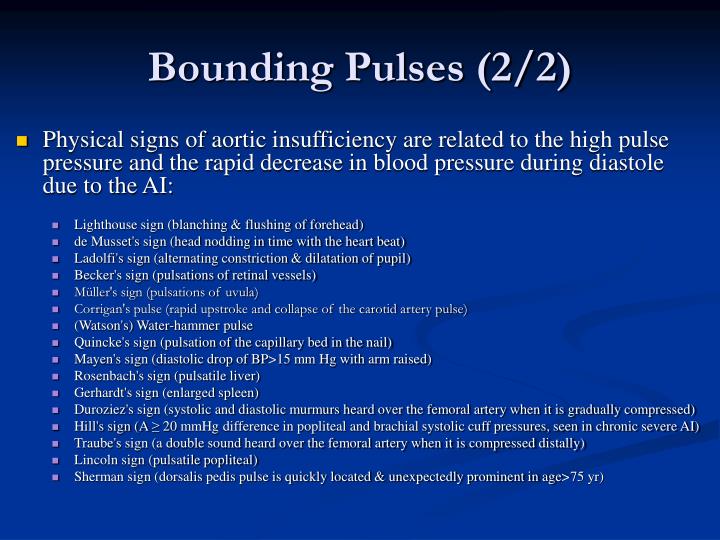A bounding pulse is an extremely strong and powerful pulse, usually experienced for short periods of time. It is also sometimes called a leaping or forceful pulse. A pulse is the heartbeat rate that can be felt at various arteries throughout the body. At times a bounding pulse is powerful enough that it can actually be seen pulsing underneath the skin as well as felt.
A bounding pulse is a pulse that feels as though your heart is pounding or racing. Your pulse will probably feel strong and powerful if you have a bounding pulse. Your doctor might refer to your bounding pulse as heart palpitations, which is a term used to describe abnormal fluttering or pounding of the heart. Bounding pulse also known as water hammer pulse, is a forceful pulse with a rapid upstroke and descent or strong throbbing felt over one of the arteries in your body. Bounding pulse is due to a forceful heartbeat. Bounding pulse is seen in many physiological and pathological conditions but is most often associated with aortic regurgitation 1). Tachycardia refers to a heart rate that’s too fast. How that’s defined may depend on your age and physical condition. Generally speaking, for adults, a heart rate of more than 100 beats per minute (BPM) is considered too fast. View an animation of tachycardia. Bounding pulse A bounding pulse is a strong throbbing felt over one of the arteries in the body. It is due to a forceful heartbeat. Bounding pulse A pulse that reaches a higher intensity than normal, then disappears quickly. Best detected when the arm is held aloft.
When a person has a bounding pulse, it can usually be felt quite easily at a number of points throughout the body, where an artery can be pressed gently against a bone. A few of these pulse points that are commonly used include the carotid artery in the neck, radial artery in the wrist, popliteal artery behind the knee, and a few other points. When it is powerful enough to be seen, it is usually visible in an artery that is located near the skin.
There are several normal conditions that can cause a bounding pulse. Some of these include strenuous exercise, anxiety, pregnancy, fever and alcohol use. A bounding pulse caused by one of these normal conditions is usually accompanied by a rapid heartbeat as well. At times, the person experiencing it will be able to feel the sensation of the pulse without touching a pulse point. It's not a cause for concern and frequently disappears on its own, or after a few minutes rest.

Occasionally a bounding pulse is not caused by normal conditions and can be indicative of a more serious medical issue. In these cases, the bounding pulse is often a sign that there is too much fluid present in the circulatory system, a condition called fluid overload, and can occur along with a rapid heartbeat or alone. A few examples of these medical issues include high blood pressure, aortic valve regurgitation, heart failure and chronic kidney failure.



Bounding Pulse Anxiety
Ratoc driver download for windows 10. A doctor should be consulted if a person experiences a bounding pulse that appears suddenly, and is particularly severe, persistent and does not appear to be caused by normal circumstances. This is especially important if it is accompanied by other symptoms, or if it does not disappear after resting. The doctor will do a physical exam that may include heart monitoring, and will ask a series of questions designed to figure out the cause. He or she will rule out normal causes first, and then investigate further.
Bounding Pulse Causes
Once the doctor has some information, diagnostic testing may also be done. This can include a chest x-ray, blood testing such as a complete blood count, an echocardiogram, and an electrocardiogram, as well as other tests as needed. With test results and other information the doctor should be able to make a diagnosis, and recommend treatment options.
